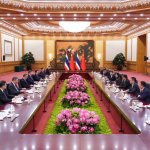
Last Friday’s Constitutional Court verdict saw the dissolution of the second largest opposition party in Thailand, the Future Forward Party. The Thai Court dissolved the party after their charismatic leader, Thanathorn Juangroonggruangkit gave the party a $9 million loan to finance their election campaign, supposedly violation of the 10 million baht ($315,000) limit. The Future Forward Party was seen to be a challenge to the ruling pro-military, pro-monarchy government, with a political agenda to curb military spending and the swagger to bring a new generation of young Thais into the political process. In the March 2019 election, more than 6 million Thais voted for the Future Forward Party, bringing with it a very real threat to the pro-junta government, led by former Royal Thai Army General and Prime Minister Prayuth Chan-o-cha.

News of the demise of the Future Forward Party also brought with it a strong reaction from Thai people, most notably from their supporters–young university students. This past week, political protests erupted on university campuses all across Thailand, stoking memories of past protests. As soon as the verdict was read, more than 300 students at Thammasat University lit candles in a kind of symbolic action against injustice and the use of the Thai judiciary for political purposes. At Chiang Mai University students carried signs and issued a statement in support of the Future Forward Party. Both protests were said to be monitored by the Thai police. One student protest at Suankularb school was cancelled after management banned mass gatherings on the school grounds. The director said that rallies could pose a danger to the institutions of “nation, religion, and monarchy”.
There has been a somewhat cautious response to the protests from the Thai government, who have merely called upon students to break up their protests on account of the coronavirus spreading across Thailand and much of the globe. Only more recently did the Thai Police warn students not to “touch upon the monarchy. Criticism of the monarchy, or lese majeste laws bring with it a sentence of up to 15 years in prison. The call by the police came after “subtle” references to the royal family were seen on some signs during the past week’s student protests.
Student protests in Thailand have taken ominous turns over the past five decades–some of which have ended badly. The most notable student movements occurred in the mid-1970s when the state, influenced and supported by right-wing anti-Communist groups opened fire on students on the campus of Thammasat University. Students were rallying against the return of former dictator and military strongman Thanom Kittikachorn. More than 40 students were killed in the mayhem, but other estimates suggest hundreds may have died and many more injured. More than 3,000 people were arrested.
More recently, the Black May protests that involved more than 200,000 people–including many students ended in the deaths of more than 50 people. People took to the streets to protest the military government of Suchinda Kraprayoon. In the military crackdown that followed the protests, hundreds of people were injured, including students and journalists. More than 3,500 people were arrested–and some allegedly were tortured during their confinement by the Thai state.
However, the protests could spell a downward trend for Prayuth and his coalition government. It remains unclear how long the pro-monarchy establishment would want to support a Prime Minister that is seemingly unpopular among the population. The rash of student protests and the disenfranchisement of more than 6 million Thai voters could provide ample reason for a political change in Thailand. In the short-term, the government has become stronger, in part because of nine former MPs of the Future Forward Party now switching to the pro-government Bhumjaithai Party.
There is a sense that the Prayuth government is unable to reconcile the cavernous differences in the country, which stretch from the rural Red Shirts in the North and Northeast to the more pro-monarchy interests in the suburbs. The Red-Yellow cleavages of the past two decades have given way to a divide between the pro-military ruling class and Thailand’s more empowered youth. So far, the government has yet to propose any policy or programme to bridge the divide. For example, on Valentine’s Day, the Culture Ministry ordered the production of at least one war film per year to boost patriotism and support for the monarchy. Younger Thais are less likely to support these efforts and student leaders have suggested that students view these tactics as a way of forcing obedience to the Thai state rather than instilling patriotism or love of country.
While the student protests are so far confined to Thai university campuses, if history is a predictor of future behavior, Thai students will likely take their protests elsewhere if so empowered. In the past, small victories led to larger and larger acts of mass mobilization in Thailand. The National Student Center of Thailand started small in the late 1960s and by 1973 had forced a dictator into exile. If students and their supporters take to the streets, as history has shown, it will eventually force the hand of the state.






